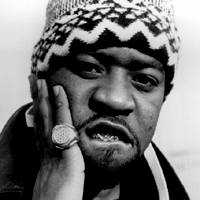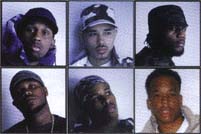The Wu Family
Cappadonna
Cappadonna (b. circa 1969) was one of the last members to join the Wu-Tang Clan. He had known the members since grade school in Staten Island, and he had even decided at the age of 15 that he could write and perform lyrics. It wasn't until 1995, however, that he made his recorded debut, appearing on Raekwon's Only Built 4 Cuban Linx album. With that album, he became an official member of the Wu-Tang Clan, and from there on out, he frequently appeared on Wu records. In 1996, he played a large role on Ghostface Killah's Ironman. During 1997, his Wu apprenticeship continued, as he rapped on the Clan's second album, Wu-Tang Forever. Cappadonna's solo debut, The Pillage, finally appeared in March 1998. Like any Wu project, the record featured RZA as the executive producer and cameos from a number of other Wu members, including Method Man, U-Cool and Raekwon. As the sixth Wu solo project, the album was an instant success upon its release, debuting at number three on the charts. ~ Stephen Thomas Erlewine, All-Music Guide
 Killah Priest from Sunz Of Man
Killah Priest from Sunz Of Man
Since the beginning of humankind's recorded history, virtually every culture across the globe has prophesied of a special being who will appear during the last days as both a messenger and enforcer of a divine message. This promised savior has taken on many forms throughout time, from the Hebraic Messiah to the Islamic Mahdi. Yet despite the myriad variations in origin, ethnicity and ideology, this inherent philosophy remains unchanged from society to society: When the world's sins and iniquities reach critical mass, a supreme being will emerge to strike down the false prophets, lead the righteous into salvation and resurrect the lost souls of the pure. Like both ancient and contemporary world cultures, hip-hop also anticipates the arrival of one with the divine intellect, wisdom and power to breathe new life into a dying art. At a time when rap music seems hell-bent on self-destruction - whether by the blatant commercialism of the current crop of hit-makers, or the copycat mentality of the next wave of up-and-comers - a shining star has appeared on the horizon. Armed with the infinite knowledge of past civilizations and the street sense of present-day urban warriors, his name is Killah Priest. "My mission," says the Brooklyn-born Priest, "is like that of Moses. I've gotta gather up the sheep and take 'em back to the holy land. I'm taking 'em back to peace." As a testament to his sworn life's work, Killah Priest's debut opus, Heavymental (Geffen Records), is nothing short of a masterpiece, an incomparable collection of knowledge and wisdom that reveals a deep understanding of world history, spirituality, politics and the many intricacies of human existence. In 1995 Priest made great strides in spreading enlightenment with his contributions to Liquid Swords, the first solo turn from the Wu-Tang Clan's GZA/Genius, including a razor-sharp verse in the track "4th Chamber" and the standout solo cut "B.I.B.L.E." (He's made several other cameos in recent years as well, among them the title cut from the Gravediggas' Diary of a Mad Man, "Snakes" from Ol' Dirty Bastard's Return to the 36 Chambers, and "America Is Dying Slowly" from the AIDS benefit album of the same name.) Since then, he's been waiting patiently for his turn to make and change hip-hop history. As a young rap disciple growing up in the hot spots of Bedford-Stuyvesant and Brownsville, Brooklyn, little did the man-child who would later be called Killah Priest know the impact he and his chosen family would one day have on the ghetto-spawned culture of hip-hop. "My environment was very, very hip-hop cultural," he remembers. "We used to listen to and study the old-school tapes, from Cold Crush Brothers to Fantastic Five. So about the time Eric B and Rakim, KRS and brothers from that era came out, GZA was just there bombin' niggas. Just straight MCin', y'know?" Priest readily concedes the influence Genius and his contemporaries had on him. After all, he was only a child when he fell under their sway: "I was ten years old when GZA used to come through and be battlin' niggas. There were a lot of MCs out there. In that environment, I had to make sure my style was different." Taking his cue from GZA and other formidable lyricists from the neighborhood - Suave of ONYX, Big Jaz and Jay-Z, to name a few - Priest honed his craft and eventually became as well respected as anyone in Bed-Stuy, Brownsville or Brooklyn itself, for that matter. Nonetheless, as a young man he took a hiatus from rhyming to devote more time to study. It was this self-imposed educational "exile" that Priest credits for his chosen rap aesthetic. "I had stopped MCin' for awhile, but I'd always jot down words and thoughts here and there," he explains. "In those days, there were a lot of Five Percenters around my block, and GZA was one of them. They would school me, and I would also seek out others, the Church, Muslims and Hebrew Israelites, to learn what they had to impart. Since hip-hop was already a part of me, I felt that, with everything I had learned, it wouldn't be right to keep it all in and not teach anybody." Combining his newfound historical and spiritual knowledge with his already powerful rapping skills, Priest prepared himself for the eventual role of messenger by maintaining his affiliation with GZA, who has also made it a primary objective to spread knowledge through his music. Later, GZA would help form the Wu-Tang Clan, and Priest would put together three of his own comrades to head a Wu-Tang faction, the Sunz of Man. It was GZA who brought Priest to the attention of A&R executive Wendy Goldstein, who signed them both to Geffen Records. In keeping with the Wu-Tang family's code of solidarity, Heavymental (released March 10, 1998) is a team effort of mythic proportions. Along with production from True Master and 4th Disciple, the album features Ol' Dirty Bastard on "If You Don't Know" and Inspektah Deck and GZA on "Cross My Heart," which is not only the first single, but is also featured on the "Caught Up" soundtrack. The cut "Heavymental" showcases Priest's passion for disseminating information with every breath. In spoken-word fashion, he takes the listener on a stark, poetic journey through time and space, from the places spoken of in Old Testament biblical accounts to the farthest reaches of the most distant galaxy. But what truly separates Killah Priest from other rappers with a message is his unique ability to demonstrate how the experiences of past civilizations affect the day-to-day existence of the ordinary brother on the street. He fully appreciates that knowing one's history is the only way to understand one's future, as evidenced on the cut "One Step." Its haunting strings and melodic keyboards, coupled with the gospel-influenced vocals of Tekitha, shine a spotlight on Priest's intricate lyricism. This, supported by True Master's production, will make the most stubborn skeptic heed the call for knowledge of self. "I don't think it's my choice to teach," says Priest of his decision to compose message-oriented lyrics. "I think the Most High chose me, and if it's meant to be, it'll be. I know hip-hop is an instrument to send messages, so it has become my profession. I have to offer what I've learned so the people I reach can in turn pass it on to others. If you just party all the time, your environment stays the same. It doesn't make a difference what you do in your life - the system stays the same. My lyrics are made from living in this Egyptized system. I have to do something to change the system. I seek to create an art form that will help us break out of the system - physically, mentally and spiritually." Faced with the formidable task of resuscitating what was once a vibrant culture, Killah Priest comes more than equipped to do battle with those who would see hip-hop and rap music lost to the sands of time. With his penchant for provoking thought and a vast circle of reference at his disposal, he has been anticipated for a long time. And as is foreseen in the messianic legends of peoples around the world, his arrival comes at a time when his culture needs it most. At long last, prophecy is fulfilled.
 Killarmy
Killarmy
Part of the large family of groups based around the Wu-Tang Clan, Killarmy consists of Killa Sin, Shogun Assassin, 9th Prince (aka North Star, Madman), Baretta 9, Islord and Dom Pachino. Predominantly produced by 4th Disciple -- who has also worked with Shabazz the Disciple as well as Wu-Tang -- Killarmy released two singles through Wu-Tang/Priority in 1997, "Camouflage Ninjas" and "Wu-Renegades," before releasing their debut album Silent Weapons for Quiet Wars in August of that year. Dirty Weaponry followed in 1998.
As evidenced by the past twenty-odd years, a new and starkly different aesthetic emerges in Hip Hop music from time to time that not only drastically changes and influences the music’s sound for several years to follow, but also affects the fans’ perceptions of its true essence. Unfortunately, these cataclysms do not occur often enough to prevent the music from becoming stagnant at times, and hapless fans have to suffer through long, drawn-out periods of interchangeable acts and their equally unoriginal songs. Every so often, however, there surfaces a force so overwhelming that a newfound respect for the Art of Rhyme and a long-awaited resurgence in the love for Hip Hop spreads across the globe, recreating a vibe for better days. And those same fans who had been cruelly subjected to mediocre offerings from the music’s so-called “best and brightest” now rejoice in knowing that real Hip Hop is back.
This time around, the winds of change originate in Staten Island, New York. Representing Shaolin’s new delegation, G.P. Wu steps to Rap’s front lines equipped with nothing but skills, pure energy, and a genuine love for their craft. Sharpening their verbal swords while growing up in Stapleton Projects, the four-man assault squad has been waging war on rival MCs---individually and as a unit---for over ten years. After paying extensive dues, they’re eager to embark on their first official mission: to rescue Hip Hop from its current state of imprisonment.
“Our main intention is to bring Hip Hop back, back to originality. We used to love turning on the radio and hearing the different sounds: KRS One, MC Shan, Eric B and Rakim, RUN-DMC. There was no comparing them to each other, but it was all Hip Hop,” declares Pop da’ Brown Hornet. Along with fellow soldiers Down Low Recka, June Lover, and Rubberbandz, the group’s point man defines their sound as being non-definable. Part of that phenomenon is the fact that the foursome had all previously been soloists who didn’t just one day get together and decide to form a group. Instead, because of their common roots in Stapleton (otherwise known as “The Temple”) and their ties to the “Gladiator Poss” (from whence was originally derived the G.P. aspect of their name), the four evolved into one over a period of several years.
The group’s debut opus, Don’t Go Against The Grain, signifies a return to the “basic elements” approach to Rap music: no gimmicks, no contrived image, just straight-up beats and rhymes. Besides serving as an admonition to those who may harbor envious feelings towards them, the album’s title also illustrates their philosophy towards others in the music industry. “I respect you and you respect me. Everybody has their own grain. To not go against it means that if we have conflict, we can elevate ourselves through communication and understanding,” says Pop.
As the album’s first single, the promo-only “Black On Black Crime” features production from RNS, known for his work on fellow G.P. affiliate Shyheim’s projects. Although the song was.originally released as an independent venture over a year ago, it is even more relevant now in light of all the violence within the Rap community. The follow-up single, “Hit ‘Em Wit’ That Shit,” can best be described as a showcase of talent. True to the framework of Hip Hop, it is a song about nothing more than being the best at what they do. “Party People,” as the name suggests, is a cut for the people. Reminiscent of the “back in the day” party jams, the up-tempo track is the perfect blend of new-school skills with old-school flavor.
In keeping with their “do for self” mentality, most of the production on the album was done by Down Low Recka. “I was forced into this production thing, sun,” he confesses, “After we realized that nobody was going to go all out for us like we would, I taught myself how to do this.” And like the true-school masters of old, he is intent on remaining diverse and wholly original: “I don’t want you to hear any of my tracks and be able to say, “That’s a Down Low beat.”
Like the earth, air, fire and water of which the world itself is comprised, each member of the group adds his individual strength to his corner of this impenetrable square, making the rock-solid G.P. Wu structure just the force necessary for the resurrection of Hip Hop. As Pop explains, every man is a separate element: “My shit? Blunt, straight, deep, coming at you. I’m not trying to make all these dips, dives and curves. I get the point across with truth and facts. June is just mad energy. He doesn’t drink, doesn’t smoke. He’s got all the air. “Bandz is sporadic, bouncing all over the track. And Down Low is the analyst. He’ll stay back in the cut, observing, then he’ll come up and wreck shit.”
Heeding the cries of those hapless fans who long for the revitalization of Hip Hop, G.P. Wu arrives in time to do battle with any and all who seek to stagnate and eventually eliminate the culture. And like folk-heroes armed with verbal arsenals of mythic proportions and a clear-cut mission to redirect Hip Hop music, the G.P. Wu legend will endure for years to come. This is only the beginning…
Bio Courtesy of MCA Records.
